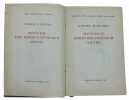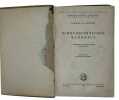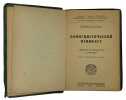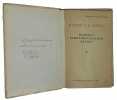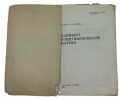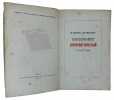249 books for « marx k engels f »Edit
-
Latest
Last 24h (2)
Last 3 days (5)
Last week (1)
-
Language
French (243)
Russian (6)
-
Century
19th (3)
20th (160)
21st (6)
-
Countries
Belgium (1)
Canada (4)
Denmark (8)
France (221)
Italy (1)
Switzerland (8)
United States of America (6)
-
Syndicate
ALAC (4)
ILAB (153)
NVVA (2)
SLACES (2)
SLAM (139)
Topics
- Austria (3)
- Biography (1)
- Commune (1)
- Communism (21)
- Communism (19)
- Economics (1)
- Education (1)
- Engels friedrich (68)
- Europe (1)
- Family (1)
- Feminism (1)
- German history (1)
- Germanic languages (18)
- Germany (7)
- Germany pc (1)
- Helvética (1)
- History (1)
- Lénine (17)
- Leninism (1)
- Literature (11)
- Luxembourg (1)
- Luxembourg rosa (1)
- Marriage (1)
- Marx karl (235)
- Newspapers press (1)
- Philosophy (39)
- Political economy (5)
- Religions (1)
- Reviews (1)
- Socialism (6)
- Switzerland (1)
- Trade unionism (2)
- Translation (2)
- Ussr (1)
- Willy (1)
Marx K., Engels F. Manifest Kommunisticheskoj partii.Podgotovitel' Rubinshtejn
In Russian. Short description: Marx K., Engels F. Manifesto of the Communist Party. Prepared by Rubinstein E. Hood. Pismannik G. Portraits of K. Marx and F. Engels by the artist Avvakumov N. Bas-relief of the authors by the sculptor Vasilik N. Institute. Moscow, 1938. Managing editor V.V. Adoratsky. Portraits of K. Marx and F. Engels by the artist N. Avakumov. Bas-relief by sculptor N. Vasilyk. Text in Russian and German M. Partizdat of the Central Committee of the All-Union Communist Party of Bolsheviks, 1938. Vladimir Viktorovich Adoratsky (August 7 (19), 1878, Kazan - June 5, 1945, Moscow) - a member of the Russian revolutionary movement, Soviet historian, Marxist philosopher. Academician of the Academy of Sciences of the USSR (1932), professor (1926), doctor of historical sciences (1934) [3]. In 19311939 Director of the Marx-Engels-Lenin Institute, in 19361939 also headed the Institute of Philosophy of the Academy of Sciences of the USSR. Adoratsky was one of the first philosophers to praise Stalin as the theoretician of Leninism and the leader of the world proletariat. In December 1929, in connection with the 50th anniversary of Joseph Vissarionovich, leading Marxist philosophers were approached with a proposal to glorify Stalin as a great philosopher - a classic of Marxism. The director of the Institute of Marx and Engels, academician Ryazanov, and the director of the Institute of Philosophy, academician Deborin, refused, but Adoratsky accepted the proposal and appeared in Izvestia with a corresponding article. This step predetermined his subsequent rise and status as the formal head of Soviet philosophy. In 1936, he headed the commission for the acquisition of the archive of Marx and Engels. The Manifesto of the Communist Party (German Manifest der Kommunistischen Partei) is the work of Karl Marx and Friedrich Engels, in which the authors declare and justify the goals, objectives and methods of struggle of the emerging communist organizations and parties. This important Marxist work states that the entire previous history of mankind is the history of class struggle. The authors proclaim the inevitability of the death of capitalism at the hands of the proletariat, which will have to build a classless communist society with public ownership of the means of production. Please feel free to contact us for a detailed description of the copies available. SKUMS002165
Marx K., Engels F. Kommunisticheskij manifest.S vvedeniem i predisloviem D. Rya
In Russian. Short description: Marx K., Engels F. The Communist Manifesto. With an introduction and foreword by D. Ryazanov. Sixth edition, revised and enlarged. Marx and Engels Institute, State Publishing House, Moscow, Leningrad, 1930. David Borisovich Ryazanov - leader of the Russian revolutionary and trade union movement, historian, bibliographer, archivist, Marxist. Founder and first head of the Marx and Engels Institute, director of which he was for more than ten years. Academician of the Academy of Sciences of the USSR. The Manifesto of the Communist Party - the first program document of scientific communism, which outlines the main ideas of Marxism, was written by K. Marx and F. Engels on behalf of the 2nd Congress (1847) of the Communist League as a program of this union. In this work, with brilliant clarity and brightness, a new worldview is outlined, consistent materialism, covering the area of social life, dialectics, as the most comprehensive and profound doctrine of development, the theory of the class struggle and the world-historical revolutionary role of the proletariat, the creator of a new, communist society (Lenin V.I.). More than two-thirds of the book consists of D. Ryazanov's notes. Please feel free to contact us for a detailed description of the copies available. SKUMS002183
MARX (Karl), ENGELS (Friedrich), LENINE (Vladimir Ilitch) / FREVILLE (Jean).
Reference : 19298
Sur la famille.
Paris, Editions sociales internationales, "Les Grands textes du marxisme", 1938 1 volume In-8° (14 x 22,7cm) Broché sous couverture grise imprimée en rouge et noir. 134p., 1 feuillet. Bon état sauf petits défauts de brochage: petite fente (2 cm) à la couture de 2 feuilles, 1 feuille à demi débrochée dans le dernier cahier.
Peu courante 1ère édition de ce recueil d'extraits de textes de Karl MARX, Friedrich ENGELS et LENINE choisis, traduits et présentés par Jean FREVILLE (1895-1971) écrivain membre du P.C.F., critique littéraire à "L'Humanité", regroupés par thèmes: 1/ Historique: extraits de "L'Origine de la famille [...]" d'ENGELS; 2/ Vie de la famille ouvrière sous le régime capitaliste, travail des femmes et des enfants: extraits de "La Situation de la classe laborieuse en Angleterre" d'ENGELS et du "Capital"; 3/ Droits des femmes et des enfants: extraits de "Propriété privée et communisme", de "La Sainte famille" et de "L'Idéologie allemande" de MARX, de "Principes du communiste", de "Le Bouleversement de la science par Monsieur Eugène Dühring", de "L'Origine de la famille [...]" d'ENGELS, du "Manifeste du Parti Communiste" (des 2) et de textes de LENINE; 4/ Révolution socialiste et égalité hommes-femmes: textes de Lénine; en annexes, extraits de textes de Jenny MARX , Wilhelm LIEBKNECHT et Franz MEHRING sur la famille de Marx, de "La Question de la femme" de Paul LAFARGUE, et de "Notes de mon carnet" de Clara ZETKIN sur "Lénine et la question sexuelle"; index des noms.
CONTRO L'ANARCHISMO
ROMA EDIZIONI RINASCITA 1950
Edizione del 1950 di questa monografia di Karl Marx e Friedrich Engels contro l'anarchismo. All'interno: L'indifferenza in materia politica, I bakunisti al lavoro, Dell'autorita, Dagli appunti di Karl Marx sul libro di Bakunin, MArx a Bolte, Engels a Cuno, Dalle risoluzioni della Conferenza di Lodra, Degli statuti generali approvati al Congresso dell'Aja ecc... Alla fine cenni biografici sui personaggi più importanti citati nel volume. In discrete condizioni. Copertina editoriale in discrete condizioni generali con usure marginali. Piatto posteriore in parte staccato. LeEdition of 1950 of this monography by Karl Marx and Friedrich Engels against anarchism. Att he end biographycal information about the most important carachtersv cited in the volume. In good conditions.Editorial cover in fair conditions lightly worn in the extremities. Back plate is almost detached. Binding in good general conditions. Inside pages are in good conditions. In 8. cm 19x12,5. Pp. 69+(3). gatura in buone condizioni. Pagine in buone condizioni generali. In 8. cm 19x12,5. Pp. 69+(3).
Bibliothèque socialiste internationale publiée sous la direction d'Alfred Bonnet, III-IV-V. Le Capital. Critique de l'économie politique.. Avec une préface de Friedrich Engels. I. Livre II : Le procès de circulation du capital. - II.-III. Livre III : Le procès d'ensemble de la production capitaliste. Traduit à l'Institut des sciences sociales de Bruxelles par Julian Borchardt et Hippolyte Vanderrydt
Paris, V. Giard & E. Brière, 1900 - 1902 3 forts vol. in-8, [2] ff. n. ch., XXII pp., 591 pp. ; [2] ff. n. ch., XXIV pp., 521 pp., 16 pp. de catalogue Giard & Brière ; [2] ff. n. ch., [496] pp. mal chiffrées 596, demi-chagrin cerise, dos à nerfs ornés de filets dorés, tranches mouchetées, couvertures conservées (reliure de l'époque). Léger accroc en coiffe inférieure du vol. II, coins abîmés.
Édition originale de la traduction française des livres II et III du Capital. Pour comprendre l'absence du livre I dans cette publication, il faut se souvenir des conditions dans lesquelles cette oeuvre majeure vit le jour : à la mort de Marx en 1883, seul le livre I était paru (en 1867 pour l'originale allemande, au tirage de 1000 exemplaires ; en août 1873 - mai 1875 pour l'excellente version française de Jules Roy, à laquelle Marx lui-même a personnellement et activement collaboré). Par la suite, les brouillons de l'auteur ont été utilisés et retravaillés par Engels pour publier les livres II et III, parus respectivement en 1885 et 1894 dans leur texte allemand. C'est ce texte de Engels qui fait l'objet de la présente traduction ; la séparation d'avec le livre I que les interprètes n'ont pas jugé bon de retraduire se justifie à la fois éditorialement et scientifiquement : seul le livre I peut être considéré comme l'oeuvre de Marx (et c'est d'ailleurs le seul à être utilisé par les économistes, qui y voient avec raison l'aboutissement de l'école classique, et le dépassement des paradoxes ricardiens) ; les livres II et III sont trop le reflet des conceptions de Engels (et notamment le matérialisme dialectique) pour être sans examen rigoureux attribués tel quel au théoricien.Ex-libris manuscrit Pierre Quesnay, demeurant 85, boulevard du Port-Royal à Paris. - - VENTE PAR CORRESPONDANCE UNIQUEMENT
Marx K., Engels F. Kommunisticheskij manifest.S vvedeniem i primechaniyami D. R
In Russian. Short description: Marx K., Engels F. The Communist Manifesto. With an introduction and notes by D. Ryazanov. Second revised edition. M., Pg. State publishing house, 1923. The work of Karl Marx and Friedrich Engels, in which the authors declare and justify the goals, objectives and methods of struggle of the emerging communist organizations and parties. This important Marxist work states that the entire previous history of mankind is the history of class struggle. The authors proclaim the inevitability of the death of capitalism at the hands of the proletariat, which will have to build a classless communist society with public ownership of the means of production. Please feel free to contact us for a detailed description of the copies available. SKUMS002168
Marx K., Engels F. Manifest Kommunisticheskoj partii, 1937. / Manifesto of the C
In Russian. Short description: Marx K., Engels F. Manifesto of the Communist Party, 1937. Moscow, 1937. A ghost haunts Europe - the ghost of communism - a famous quote that went around the whole world, came precisely from this outstanding work of political thought. The Manifesto determined the direction of social thought for a long time, but to this day it is relevant as an important historical evidence and a masterpiece of political eloquence, as Umberto Eco called it. Karl Marx and Friedrich Engels fixed the current economic and political situation in it, but time has shown that they have become harbingers of future global events. Published in 1848, the book has sold around the world in huge numbers. Published in millions of copies, she stood on the shelves of the leading figures of that time. Now you too have the opportunity to find out what is unique about this program of transition from capitalism to communism and why it has had a decisive influence on world history. Please feel free to contact us for a detailed description of the copies available. SKUMS002181
Marx K., Engels F. Manifest Kommunisticheskoj partii, 1935. / Manifesto of the C
In Russian. Short description: Marx K., Engels F. Manifesto of the Communist Party, 1935. Moscow, 1935. A ghost haunts Europe - the ghost of communism - a famous quote that went around the whole world, came precisely from this outstanding work of political thought. The Manifesto determined the direction of social thought for a long time, but to this day it is relevant as an important historical evidence and a masterpiece of political eloquence, as Umberto Eco called it. Karl Marx and Friedrich Engels fixed the current economic and political situation in it, but time has shown that they have become harbingers of future global events. Published in 1848, the book has sold around the world in huge numbers. Published in millions of copies, she stood on the shelves of the leading figures of that time. Now you too have the opportunity to find out what is unique about this program of transition from capitalism to communism and why it has had a decisive influence on world history. Paperback, 56 p. Please feel free to contact us for a detailed description of the copies available. SKUMS002182
Marx K., Engels F. Manifest kommunisticheskoj partii.100 let. 1848-1948. Oformle
In Russian. Short description: Marx K., Engels F. Manifesto of the Communist Party. 100 years. 1848-1948. Design by S.B. Telengatera, portraits by art. N. Avvakumova) M. OGIZ 1948. Solomon Benediktovich Telengator (1903 - 1969) - the largest master of illustration and type art, a prominent representative of constructivism. This edition of the Communist Manifesto is based on the German edition of 1848. Changes made to subsequent German editions, as well as additions made by Engels to the English edition, are noted in editorial footnotes. The text is supplied with notes by Engels made for the English edition of 1888 and for the German edition of 1890. Please feel free to contact us for a detailed description of the copies available. SKUMS002176
MANIFEST KOMMUNISTICHESKOJ PARTII. Perevod s nemeckzgo izdanija 1872. S. predisloviem avtorov. Manifeste du Parti Communiste par Karl Marx et Fr. Engels.
Geneva, Volnaja Russkaja tipografia, 1882. 8vo of 50 pp., publisher’s printed wrappers, corners restored, library sign removed from the cover, slip-case. 180 x 120 mm. The very rare first complete Russian translation of the Communist Manifesto, with an original preface by the authors, written a year before the death of Marx. Prepared by Georgi Plekhanov, the present authorized edition made obsolete the 1869 first Russian translation by Bakunin which contained a number of serious mistakes and omitted several sections of the German original. Although heavily persecuted by the Tsarist government, it would have an immense impact on the Russian socialist movement of the 1880s. « Le Manifeste obtient sa consécration mondiale avec la Révolution soviétique d’octobre 1917 » (J. Elleinstein, Histoire mondiale des socialismes). Marx's and Engels' groundbreaking work of communist propaganda is "undoubtedly the most widespread, the most international production of all Socialist literature, the common platform acknowledged by millions of working men from Siberia to California" (preface to the 1888 edition). In the words of the British economist Harold Laski, the Manifesto is "admitted by every serious student of society to be one of the outstanding documents of all time". It also constitutes an early sum of Marx's and Engels's ideas, later to become known by the catchword of "scientific socialism": "[L]e manifeste renferme en puissance la quasi-totalité des idées élaborées par ses deux auteurs dans leurs ouvrages ultérieurs et qui, dans leur ensemble, représentent ce qu'ils appellent le socialisme scientifique; la seul exception importante est la théorie de la plus-value" (Andréas, p. 1). It begins with what has become one of the most famous sentences ever penned :”A spectre is haunting Europe-the spectre of Communism”. Unbeknownst to either author, it would be Russia where the Revolution heralded by the Manifesto would finally take place, under the leadership of their disciple Lenin who did not discover Marxism until after Marx's passing. Very rare and sought-after copy preserved in publisher’s wrappers.
Misère de la philosophie. Réponse à La Philosophie de la misère de M. Proudhon.
Coll. "Bibliothèque socialiste internationale", Paris, éd. Marcel Giard, 3e édition, gd. in-12, demi-chagrin brun foncé, plats papier marbré "cailloux" rouge et brun, fleurons, double filets, auteur et titre dorés sur dos lisse, couverture d'origine conservée, reliure de l'époque, XXX - 272 pp., préface de Friedrich Engels, table des matières, signature sur la première de couverture de H. Hurtel, portrait de Marx extrait d'un article de journal collé sur la page face au titre ainsi qu'une petite "vignette" reprenant un texte de H. Hurtel en 1920, "Ouvrage paru en juin 1847 à Bruxelles en son exil. Son titre constitue une reprise inversée de l'ouvrage de Proudhon, Philosophie de la misère. Le texte est écrit en français bien que la plupart des œuvres de Marx soient écrites en allemand. Il s'agit d'une critique, reprenant point par point les arguments avancés dans Philosophie de la misère et tentant de les démonter ou de montrer qu'ils enfoncent des portes ouvertes". Reliure agréable. Pas courant Très bon état de la reliure; papier uniformément jauni avec quelques très petites rousseurs éparses
MARX (Karl), ENGELS (Friedrich). La Guerre civile en France 1871 (La Commune
Reference : 5564
La Guerre civile en France 1871 (La Commune de Paris).
Paris, Editions Sociales, "Les Eléments du communisme", 1946 1 volume In-8° (13,3 x 21cm) Broché sous couverture grise imprimée en bleu nuit. 97p., 1feuillet. Bon état.
Texte de Karl MARX (1818-1883) précédé d'une introduction de Friedrich ENGELS et des "Premier" et "Second Manifeste[s] du Conseil général" (de la 1ère Internationale: textes de Karl MARX) sur la guerre franco-prussienne (23 juillet et 9 septembre 1870) et suivi de lettres de Karl MARX et de Friedrich ENGELS sur la Commune de Paris; index des noms.
GESCHICHTE UND POLITIK, 1 (Karl Marx, Frierich Engels, Band III)
Fischer. 1966. In-12. Broché. Etat d'usage, Couv. convenable, Mors fendus, Intérieur acceptable. 255 pages. Nombreuses annotations dans l'ouvrage (ouvrage de travail).. . . . Classification Dewey : 430-Langues germaniques. Allemand
Fischer Bücherei, Bücher des Wissens, 766. Karl Marx, Frierich Engels, Band III, Hrsg. von Iring FETSCHER. Classification Dewey : 430-Langues germaniques. Allemand
L'ideologie allemande, precede de Karl Marx Theses sur Freuerbach - Collection Essentiel N°1
EDITIONS SOCIALES. 1982. In-12. Broché. Etat d'usage, Couv. légèrement passée, Dos satisfaisant, Rousseurs. 279 pages. . . . Classification Dewey : 100-PHILOSOPHIE ET DISCIPLINES CONNEXES
Karl Marx / Friedrich Engels - MILHAU JACQUES- AUGER HENRI- BADIA GILBERT- BAUDRILLARD JEAN- CARTELLE RENEE Classification Dewey : 100-PHILOSOPHIE ET DISCIPLINES CONNEXES
CRITIQUE DES PROGRAMMES DE GOTHA ET D'ERFURT [Paperback] MARX (Karl) & ENGELS (F.).
Broché état correct .Pages 9-10 détachée.Contenu propre . 1966.154 pages . PHOTOS SUR DEMANDE
Merci de nous contacter à l'avance si vous souhaitez consulter une référence dans notre boutique à Authon-du-Perche.
Marx Karl Engels Friedrich Cartelle Rene Badia Gilbert Milhau Jacques
Reference : DKB44AP
ISBN : B000T6BHW0
L'Idologie allemande (Classiques du marxisme)
ëditions Sociales Broch D'occasion tat correct 01/01/1974 143 pages
Marx Karl Engels Friedrich Cartelle Rene Badia Gilbert Milhau Jacques
Reference : CPC71AP
ISBN : B000T6BHW0
L'Idologie allemande (Classiques du marxisme)
ëditions Sociales Broch D'occasion bon tat 01/01/1974 143 pages
Etudes Philosophiques (Nouvelle dition revue et augmente). Introduction de Guy Besse.
Gnrique Broch D'occasion bon tat 01/01/1974 150 pages
Correspondance, tome IV : juillet 1853 - juin 1857.
Editions Sociales 1974 Editions Sociales, 1974, 506 p., broché, environ 215x135mm, haut du dos un peu frotté, bon état et intérieur bien propre.
Publié sous la responsabilité de Gilbert Badia et Jean Mortier. Merci de nous contacter à l'avance si vous souhaitez consulter une référence au sein de notre librairie.
Correspondance, tome III : janvier 1852 - juin 1853.
Editions Sociales 1972 Editions Sociales, 1972, 506 p., broché, environ 215x135mm, haut du dos un peu frotté, bon état et intérieur bien propre.
Publié sous la responsabilité de Gilbert Badia et Jean Mortier. Merci de nous contacter à l'avance si vous souhaitez consulter une référence au sein de notre librairie.
Lettres sur "Le Capital".
Editions Sociales 1972 Editions Sociales, 1972, 456 p., broché, environ 215x135mm, bas du dos un peu émoussé, second plat un peu froissé, bon état pour le reste.
Publié sous la responsabilité de Gilbert Badia et Jean Chabbert. Merci de nous contacter à l'avance si vous souhaitez consulter une référence au sein de notre librairie.
La guerre civile en France 1871.
Editions Sociales Broch D'occasion bon tat 01/01/1952 150 pages
 Write to the booksellers
Write to the booksellers